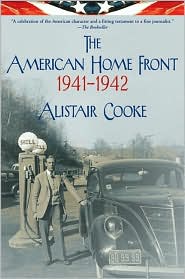 This is one of many books I've had in the house for a while but never bothered to read. It's a shame I let it sit so long.
This is one of many books I've had in the house for a while but never bothered to read. It's a shame I let it sit so long.I have a number of books by people who've attempted to travel the entire breadth of the United States to... I don't know. Find America, usually. Sometimes there's a conceit--in the case of The Cannibal Queen, it was that the traveling was done in a 1941 Stearman biplane (my kind of conceit). In Lost Continent, the conceit was the in the author's attitude to everyone he came into contact with. In other cases, there's a specific reason driving the journey, as in Haynes Johnson's Divided We Fall, a tour of America during our last (real) recession in the early 1990s (a depressing but relevant book). I enjoy the genre, but I find that there's not usually anything terribly new in it from one book to the next, once you get past the conceit or the reason. You might go to a different place, but America is America, and as Bill Bryson pointed out just about everywhere has become Anytown USA.
That makes Alistair Cooke's The American Home Front: 1941-1942 rather interesting, as he made his journey before Levittown was built, and before the rest of the country started to look like it. Cooke was a Brit sent to America by the BBC to report on America to the British. He earned his citizenship in 1941, just before the war, and embarked on this journey primarily to give the good folks back home a look at America on the brink of war. The places he visits, even those that are intimately familiar (Jacksonville and Tampa, for example), are hardly recognizable, the America of Yesteryear, yet presented without nostalgia because the book was written in Yesteryear.
Needless to say I enjoyed it immensely, because I do like the genre. But like almost every book in said genre, it was a bit too long. America is very big. You can travel around America and notice things for about 200 pages before you need to wrap it up. Really. And you can't possibly see the whole country in that time, so you have to limit yourself... or not, as no one respects the 200-pages notion. So the books always drag by the last quarter. It's not that the writing isn't as good nor the insights as fresh, it's just that, well, nothing new is happening. Change in setting is not enough to maintain interest when everything else remains more or less the same. I can't think of a book I've read of this sort that wasn't too long; even On the Road was too long. It's a shame, because either you get sick of the book and the writer, or, as in this case, you're tempted to skim parts of the last quarter, and those areas of the country last on the itinerary you're less interested in reading about.
So. I like this genre, and anything well-written in it is going to be appealing. And the greatest fault of this book is the same as that for any other in the genre, namely, it runs a bit too long. Why read this one instead of any other? I could go on about Cooke's writing, which is very nice, or his observational abilities, which are excellent as one would hope for a journalist. The truth is, though, this is an America you can not go back to. And not only that, anyone today who tries to tell you what America was like in the 1940s, even from personal experience, is going to get a lot of things wrong. We are nostalgic creatures, and nostalgia colors our view of the past. You can't change that. The only way to get a sense of a historical place is to read a contemporary writer who was deliberately trying to write about the here and now. And that is exactly what Cooke was doing.
Some travel-across-America books do not wear well, for various reasons; the writing may be substandard, the conceit may hinder readers' interest. Others will still be read decades from now. I hope The American Home Front is in the latter category. It deserves an audience, and before long there will be few people left who can even offer clouded remembrances of the era. As a historical document then, as much as anything, this is a great book. How nice that it's also such an enjoyable read.
No comments:
Post a Comment